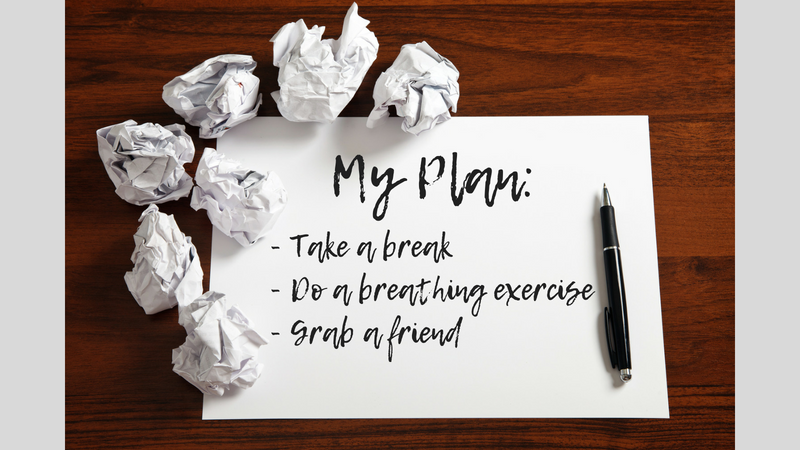They’re Symptoms, Not an Excuse
“I know you have your issues, Teresa, but you have to find a way to deal with them.” That was my husband in a moment of deep frustration after I’d been irritable for several weeks as part of a mixed hypomanic phase. He was right. I was acting like an a**hole, and it wasn’t fair to our marriage and our family.
One of the first things I encourage people to do after getting a diagnosis is to get deeply familiar with their disorder and the symptoms they personally experience. The benefit to this is that it makes it much easier to advocate for ourselves with our doctors and to stand our ground against societal stigma.
Sadly, this is necessary, as evidenced recently by a young man in Silicon Valley who had an anxiety attack and was told by a doctor that it was all in his head.
Or, like a woman in my Facebook group, who is experiencing multiple physical symptoms and whose doctor told her it was all symptoms of her anxiety. After consulting resources and better familiarizing herself with the symptoms of anxiety, she was able to go back to her doctor and pursue a better solution for herself and her health.
There is another personal benefit to getting to know our symptoms: It helps validate our personal experiences and can help us understand certain aspects of our personality.
For me, this reflected in the history of absent-mindedness I have. I was notorious as a teenager for leaving my purse on the bus; I had the number for the bus company’s Lost-and-Found department memorized. It frustrated my parents to no end, and they begged me to write lists and do a double-check before leaving the bus. Understanding that absent-mindedness is a common symptom of manic/hypomanic phases of bipolar disorder helped me gain peace over those experiences and compassion for myself.
Another common one I hear from people who live with depression is the difficulty showering. Many think this is a personal failing and not a symptom of depression. Understanding that it’s a symptom instantly validates and helps them feel less alone in the experience.
Understanding our symptoms isn’t about building excuses; it’s about knowing our challenges and coming up with strategies to combat them.
Understanding my symptoms has been good for my husband, too. It helps him take my tougher moments with more grace and understanding. Challenging conversations are easier to hold as we can focus less on my personal failings and more on how to help me manage situations. We are more effective in our problem-solving.
There is a flip side to understanding our symptoms, however. In gaining an understanding of the symptoms, it can be easy to accept them as just the way things are. We can allow ourselves to say, “I don’t feel like showering today. That’s just my depression.” Making an effort to change and heal while having compassion for ourselves in the process is not the same as surrendering to the symptoms.
This is especially true when it comes to the relational aspects of our disorders. People with borderline personality disorder are notorious for a push-pull, manipulative approach to relationships. Many of them require a course like DBT to learn healthier relating skills. With bipolar disorder, many of us (including me) experience irritability as part of our manic/hypomanic cycle(which may seem contradictory, as mania is typically associated with feeling elated). This irritability gets expressed easily and can make it difficult to be around us.
It would be easy for me to simply say, “Oh, I’m hypomanic; of course I’m irritable” and expect my family to adapt to what I’m experiencing and how I’m expressing it. But the reality is that if I want a healthy marriage and a good relationship with my daughter, I have to make a good-faith effort to manage my irritability. If I wish to have close friends, it is my responsibility to not push them away in a moment (or patterns) of pique over smaller details.
Understanding our symptoms isn’t about building excuses; it’s about knowing our challenges and coming up with strategies to combat them.
I’m not saying this is easy; I’m merely saying it’s important.
While I’m not perfect at managing more challenging symptoms like irritability, I’ve seen significant improvement. It’s taken work, like attending DBT classes and developing a mindfulness practice. It’s required doing CBT exercises to learn my triggers, uncover hidden stories, and correct inaccurate thinking. I’ve gone to therapy consistently and make sure I take my medications daily and on time.
It’s meant learning to breathe between an event and my reaction, and intentionally choosing an appropriate response.
I’ve had to learn systems and implement changes to counter some of my symptoms. I lost two keyless remotes in the space of 6 months; I now have a flexible cord attached to my purse so I can’t forget another one. We do a visual and physical check to make sure I have my credit card, phone, sunglasses, and wallet before we leave a restaurant, a process we put in place after a wave of forgetfulness cost us money, time, and significant inconvenience. While this is all a pain and I’m not thrilled that I need to do these things, they are easier than dealing with the consequences of unchecked symptoms.
I’m not saying this is easy; I’m merely saying it’s important.
Awareness of my symptoms helps me identify when I’m entering a cycle, and through mood tracking, I now know that depressions follow my manic cycles. I can also see that I’m managing both cycles significantly better, and that’s further evidenced by my improving relationships.
The best part about taking these steps is that the more I learn to manage my symptoms and experiences, the easier they become to manage. I have increased emotional capacity, which makes it easier to control my irritability. I have routines, which means I’m less likely to be forgetful, and that frees up both the emotional and physical energy I need to take the next steps in my recovery process. And in all this, I gain peace and ease in my own skin.
My a**hole factor has dropped significantly, and I’m proud of that.
How has your diagnosis impacted your relationships? What are some things you need to be mindful of? I would love to hear from you in the Comments section below!
Looking for daily inspiration and community? Join our warm and supportive Facebook group!









